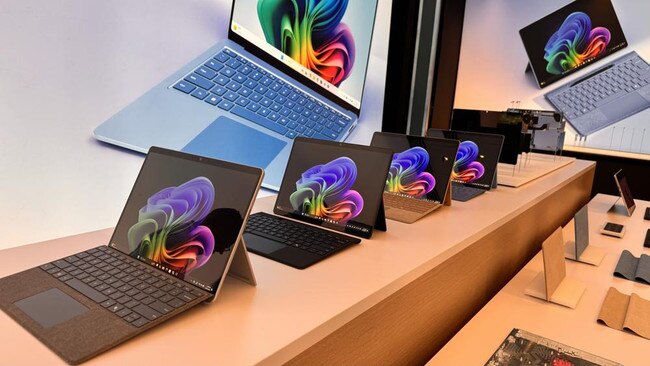AI future for everyone after new PCs hit the market to assist daily life
AI has entered the mainstream, says Harvey Norman chief executive Katie Page, as a new line of laptops hits the Australian market to assist in daily life whether at home or in the office.

Artificial intelligence has entered the mainstream, says Harvey Norman chief executive Katie Page, after a new line of laptops featuring hardware specifically designed to run the technology’s power hungry tasks hit the Australian market.
Microsoft unveiled what it calls Copilot+ PCs in Seattle last month and expects to sell 50 million units this year. This includes its own Surface branded devices and computers from the other Windows-based PCs manufactures such as Acer, Dell and Hewlett Packard, bolstering sluggish global sales.
Interest has been strong at one of Australia’s biggest retailers, Harvey Norman, which says it has created a similar buzz to the launch of an Apple product. It started selling the computers on Tuesday after taking pre-orders during the past few weeks.
The Copilot+ PCs – which are optimised for Windows using Qualcomm’s Snapdragon X chip – will deliver up to 22 hours of battery life while playing videos locally and up to 18 hours while browsing the web – which Microsoft says beats the latest MacBook Air by 20 per cent.
“We talk about revolutionary technologies, but the transformation AI is making will be unprecedented,” Ms Page said.
“AI has been in our midst, but now thanks to Microsoft, Qualcomm’s Snapdragon and the PC manufacturers the AI-enabled future is a reality for everyone. AI can now be accessed in the home and within small business to assist in daily life.”
Tech companies have been rapidly launching new ChatGPT-style AI apps, sparking an unprecedented level of technological innovation, with some regulators across Western markets struggling to keep up.
The new computers use efficient ARM processors, similar to the chips inside smartphones – which Microsoft says will set it up for the next decade and change the way we interact with PCs

The technology underpinning the new Copilot+ PCs – or what Harvey Norman describes as “Next Gen AI” – isn’t entirely new. Apple switched from using Intel chips to its own ARM processors – known as Apple Silicon – in 2020.
Microsoft says it has been watching Apple closely, and boasts that its new Copilot+ PCs are 58 per cent faster than the latest MacBook Air.
But competition is intense. Apple briefly reclaimed its spot has the world’s most valuable company last week, overtaking Microsoft, after it announced it was integrating OpenAI’s tech into its mobile operating system, further shaking up the competitive landscape for AI dominance.
Microsoft surged ahead again this week, with a market value of $US3.32 trillion ($4.98 trillion) versus Apple’s $US3.29 trillion on Thursday. But neither company can claim to be the world’s most valuable after AI chip maker Nvidia leapfrogged both of them, with a market capitalisation of $US3.34 trillion, underscoring investor appetite for what has been touted as a technological advancement bigger than the launch of the internet and smartphones.
But how does this translate to everyday Australians when they walk into a retailer like Harvey Norman, searching for a new computer?
Harvey Norman general manager of computer technology and entertainment Jeff Woodhouse said it was all about value.
Particularly, he said, the advances in hardware that ease some of the anxiety around machines becoming outdated too quickly.
“It sort of makes people probably think ‘I might have originally gone for x notebook’ but because of these multitude of features, and also knowing that it’s moving so fast that there could be apps or features out in six months time, that if it doesn’t have some of the hardware, then they’re sort of not as future proofed as you can be in a technology world,” Mr Woodhouse said.
“For example, in Photoshop, what you can do now with generative AI, the time saving is unbelievable. Some of the productivity tools in Teams and other stuff that will keep coming through, people say ‘actually that’s worth a lot to me’, because it’s something significant for those individuals, and more and more, we keep seeing those sorts of people come through. It creates a value equation.
“There’s a lot of excitement, a lot of people even just sort of wanting to have a bit of look at and feel, but certainly like it’s been well received and performed to expectations.”
The Copilot+ PCs’ AI capabilities can also teach people to play games like Minecraft, using their voice in a conversational style with a bot, or create artwork in myriad styles using a few crude brushstrokes on a screen with a stylus.
But one feature unveiled at Microsoft’s headquarters in Seattle last week, will not be available after it sparked privacy concerns. Microsoft delayed the launch of its Recall function, which was designed to capture everything viewed or recorded on a PC to gives users the ability to tap into “photographic memory” to help find files more easily.
Microsoft head of Windows Pavan Davuluri said the company halted the launch of the feature after “receiving feedback on Recall from our Windows Insider Community”. “We are adjusting the release model for Recall to leverage the expertise of the Windows Insider community to ensure the experience meets our high standards for quality and security,” Mr Davuluri said.




To join the conversation, please log in. Don't have an account? Register
Join the conversation, you are commenting as Logout